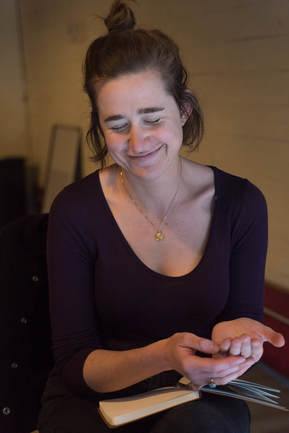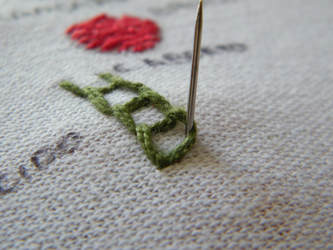 Lena, ready to receive the writing prompt: Green Windows monthly workshop February 2017. Lena, ready to receive the writing prompt: Green Windows monthly workshop February 2017. I remember a few years ago, I was going through childhood stuff as I started to move the last of my things out of my parents’ basement, and I found poems I wrote when I was probably in the 5th grade. I wrote a few that were what I thought poetry was supposed to sound like, a few that were what I thought cute girls were supposed to write about, and then there was this other one. I was really passionate about the wild world as a kid. I was part of a project that same year where my friend and I raised money to help protect snow leopards. I used to keep a sticker collection, like most 90’s babies, and the front cover was a tree frog. I had a budding monkey stuffed animal collection, and anytime I could, I escaped to the woods behind my house, where no one could hurt me. I’m a trauma therapist for children and families at an elementary school. A lot of what motivated me to get into the work I do was my own trauma as a kid. I was sexually abused by an older neighbor who also bullied me in front of other kids from age 5 to 10, and my family had a lot of dysfunction, to say the least. School, the woods, books, writing, my own fantasy world: These were what kept me alive. I was that kid who could read and walk through the hallways from classes--to this day, my peripheral vision is on fleek. This poem I found was about big construction vehicles rolling through a beautiful, pristine rainforest; ugly, metallic machines attacking the sweet greens and damp brown of the earth and bright red of a flying bird leaving its disappearing nest. The animals began to run until the snakes hissed back. The snakes hissed back and led a revolt and the animals turned around and took down those big machines with all the power of them standing up for the protection of their home. I read this poem, and I knew that the part inside me that, 15 years later, started my own personal revolt against my abuser and the environment that broke my heart and my innocence, started it with this poem and the teacher that asked me to write it and wanted to hear me read it. I read this poem, and I knew that I wanted to be the person who would ask others to write about how they would start their revolts and then help them start them. Today, I’m lucky to get to hear those stories and to help re-write them so that the suffering, the cycle of abuse, stops. I try to remember to never underestimate the power of a poem, a metaphor, a story. When I found Green Windows last year, I was ready to write more of my story, and Peggy and the group of amazing people she manifested every month kept me coming back and writing more. The writing below is an excerpt from a book I’m writing based on my own story and all the stories I’ve heard throughout my lifetime.  Excerpt from Frontera by Lena Nicodemus Mama helped Jo learn to stitch when she was old enough to hold the needle and the circular frame. It went in and out to the speed of their singing of songs that neither were old enough to fully understand. Jo would often overshoot the needle and accidentally stab herself in the pad of her index finger. “Ow!” She would pull her hand back as the costura became tinged with a little red dot of blood. “Los errores son parte del aprendizaje,” Mama said then, something Abuela had taught her, something that Jo would tell her own children someday as a bookmark for moments of flawless idiosyncrasy. When the phone rang for the last time, it was months after the accident, and Grandma May lay flat on her bed with the orange curtains pulled closed at any time of day. Stale café and pan sat cold on her nightstand, next to a picture of Grandma May and Grandpa George with Mama, who looked up at her two smiling parents with no expression. “Vente, vente,” Grandma May beckoned. “Vente por aca.” Her hands are wrinkly and dry. Jo opens the nightstand drawer & takes out the oil, rose, and sandalwood, with corn oil to make it last longer. She rubs Grandma May’s hands. She closes her eyes. She remembers the Sunday school teacher telling them the story of when the ladies, implicitly whorish, washed Jesus’ feet. Jo imagined washing the Sunday School teacher’s feet while he read the story over and over on a loop, incessant and dull. She imagined playing that game where you dart a blade between the webbing of a hand, and doing that to the Sunday School teacher’s feet. She would take the dullness of that blade and slide it between each of his toes as she made him breathe in and out and keep quiet. The phone rings, and the attic is oddly silent. The phone rings, and Jo becomes aware of her mother’s radio two floors down, reverberating through the dry, wooden floorboards. The phone rings, and there’s no one on the other line. The birds of paradise at the edge of the property swivel in the air, being put off by the helicopter blades. Tomás holds the curling edges of the burning books until they get too hot and he drops them, one by one. The kiddie pool full of the ceniza of 1000’s of words and letters by underpaid and over-emotional authors starts to melt from the heat. He goes for the phonebooks as well, burning “Aguilar” to “Zafón” and “air-conditioning repair” to “yard waste removal.” There is a book with leather skin, a book with a note written in blue on the inside cover. “For Carlos, Please call me when this is over. I love you, I miss you. Please come home.” The signature is illegible, the P.S. unreadable. The title of the book is “Frontera”. “Border”.
0 Comments
Leave a Reply. |
Categories
All
Archives
July 2020
|
 RSS Feed
RSS Feed
